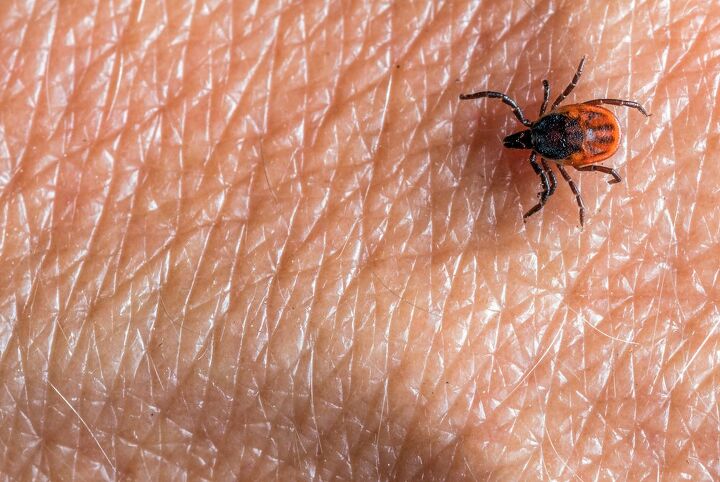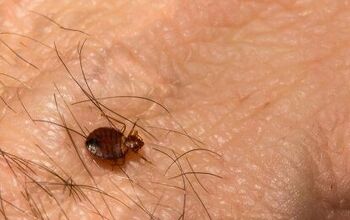Bed Bug Vs. Tick: How to Tell the Difference

If there were a battle between a bed bug vs. tick, there would be no true winner. With either of these in your life, you would be the sore loser. They both have unique qualities but prove to be more of pests than helpful, even in the bug world.
When it comes to bed bugs vs. ticks, there are several significant differences between these two unpleasant creatures. They are both blood-sucking bugs, and they disgust anyone that encounters them. However, their physical features, habitat, and eating habits are quite different.
Choosing which bug you would rather encounter comes as no easy task since many people strongly dislike both pests. Understanding the differences between these insects may help you to differentiate which pest you may be dealing with. Let us dig deeper into these bugs before they dig into you.
Do You Need Pest Control Services?
Get free, zero-commitment quotes from pro contractors near you.

An Introduction To The Bed Bug And The Tick
When it comes to which bug you would rather have in your home, both are no walk in the park. Bed bugs have proven to be an impossible pest, while ticks are sneaky and irritating. If there was a battle between the two, there are facts that would help to pick a winner.
In the following sections, you’ll see a breakdown of how ticks and bed bugs differ. In reading on, you can discover some facts about each insect that will help you understand them both.
Bed Bug vs. Tick: Hosts
Neither of these pests fly or jump, but both rely on their host. When a host comes close enough to a bed bug or tick, they crawl onto them. Ticks tend to stick with their host till they are full while bed bugs come back, much like mosquitos.
Each host is left with an itchy bump since both bugs bite and leave their saliva behind. The difference is bed bugs can leave multiple bites since there is never just one, while ticks usually stay put. Since both feed on blood, their host gets an unfortunate surprise in the form of an infected bump.
Ticks have been known, as an adult, to survive up to 600 days without a host. Bed bugs can only survive for a year without a host. They both need a constant supply of blood, but ticks use their supply slower.
Winner: Bed Bug. Though ticks can survive longer without a host, bed bugs are a constant irritant. Bed bugs constantly bite and re-bite the same host, leaving behind numerous bites. Bed bugs can be an irritating and continuous annoyance since they come back over and over again.
Bed Bug vs. Tick: Habitat
As the name suggests, bed bugs like to spend their time waiting in beds or other soft furniture. Ticks usually are in tall grass and trees while they wait for a host to walk by. Bed bugs can also survive in the carpet, though it’s not ideal for crawling onto a host.
Ticks can fall out of trees onto their host and have been resilient to freezing or harsh weather. Bed bugs can also be quite resilient to colder temperatures, but the extreme cold will kill them. Both bugs can live outside, but you often see bed bugs in a dirty hotel or luggage.
Winner: Tick. They are both strong and survive a long time without food, but a tick is an obvious winner. Though bed bugs can live inside your furniture, ticks can live outside without a host for an extended time. Ticks are also challenging to find in their habitat since they tend to hide in grass and trees.
Bed Bug vs. Tick: Identification
Bed bugs are flat, round, and reddish-brown, with only two known species around a quarter-inch in length. A tick is flat until full of blood and can be a variety of colors since there are over 900 known species. They both like to lurk in cracks and crevices, often in human domains, while ticks live off humans and animals.
Ticks can appear on animals and humans alike, but they prefer animals. Their big, round bodies fill with blood as they suck it out of their host. Bed bugs usually bite repeatedly and are more like mosquitoes and usually only feed on humans.
Both pests are tiny; bed bugs are typically quite a bit larger than ticks. Before feeding, the most common species of ticks are roughly the size of a sesame seed, and an unfed bed bug is around the size of an apple seed.
Winner: Bed bug. Bed bugs are usually larger and easier to discover than ticks which are smaller and harder to find. However, there is such a wide variety of species of ticks, and you can find them on humans and animals. Ticks are small until full of blood and barely leave a trace.
Bed Bug vs. Tick: Disease Transmission/Illness
Both pests live on human blood and have been doing so for centuries. Though bed bugs don’t transmit disease or pose any serious medical risk, they can leave itchy bites. In contrast, ticks can give humans numerous illnesses and diseases.
Ticks give humans Rocky Mountain fever, tularemia, and the most common tick-borne illness, Lyme Disease. Bed bugs only transmit a constant, intense, itching bite all over your body.
Winner: Tick. Since ticks are known to transmit various diseases and illnesses, that makes them the bug to beat. They are by far the worse critter to get rid of, and the risk of getting sick from a bite is greater.
Bed Bug vs. Tick: Pest Control
Ticks can be difficult to spot since they look like dirt or a freckle. They are not known to infest homes but mainly your pets and skin. Bed bugs have a terrible reputation of invading homes and causing significant problems in exterminating them.
To kill ticks, you may need tweezers, a jar, and tape or rubbing alcohol. Bed bugs are a critter that has to be eradicated by fumigation and pest control. The best way to tell if you have bed bugs is to see the live creatures for yourself.
Bed bugs love to live and hide behind wallpaper and inside box spring mattresses. Once bed bugs take up residence, you may think of washing your clothes, but only extreme heat kills them. However, you can take care of ticks by yourself or with a vet for your pets.
Having a tick is often a one-and-done deal, while bed bugs can spring up after fumigation has occurred. Their eggs, if you miss any, can hatch and restart a new infestation.
Winner: Bed Bug. Ticks and bed bugs require some work to get rid of them, but bed bugs need professional help. Since they can live and reproduce in carpets, fabric, and mattresses, you can get infested quickly and without warning.
Related Questions
Are bed bugs and ticks nocturnal?
Bed bugs feed at night while you are sleeping. However, although bed bugs are primarily nocturnal, ticks are diurnal, meaning they prefer to feed during the daytime. Some ticks like to find a host during the cool morning hours, but most are more active during the warmer afternoon.If there is competition for food or because you work a night shift, bed bugs will bite during the day. And although bed bugs prefer the cover of darkness, it isn’t necessary to leave a light on. Ticks can be out and about any time of year.
How do you prevent bed bugs?
Bed bugs love to hang on to old furniture and infest cluttered spaces. The best way to prevent bed bugs from infesting your home is to keep it clean and clutter-free. By covering mattresses with a cover, you can prevent bed bugs from nesting into the crevices of your mattress.If you love to thrift shop, it’s a good idea to check any furniture for stragglers before bringing items home. Vacuuming and constantly cleaning can help prevent bed bugs from laying eggs and living on your carpet. Also, sealing cracks and holes in your home prevents bugs, especially bed bugs, from coming in unwelcomed.
How do you prevent ticks from getting on you?
If you love the outdoors and hiking, covering your arms and legs can prevent ticks. Even putting tape around openings in clothing so ticks have no access to your skin is best. Keep to the center of a well-used trail because ticks are less likely to be there.As soon as you get home, check yourself or have a family member help you check for ticks. Sometimes using a comb or fingers to rub your skin will help look for unusual bumps. You should also shower and wash your clothes at high heat to kill any ticks in the process.
Do You Need Pest Control Services?
Get free, zero-commitment quotes from pro contractors near you.

Our Final Take
From all the facts listed above, both bugs have their strengths and weaknesses, but both are general nuisances. With the difficulty in finding them, possible illnesses, and irritation, it’s a no-brainer you want to avoid both. These bugs have created names for themselves as actual pests.
Neither one would you care to encounter, but if you had to, a bed bug may be the one you would choose. Though they can be an annoyance in your home, with professional help, you can get rid of them. Bed bugs can annoy you in your sleep and your home, but ticks can give you numerous illnesses.
Bed bugs have been known to reinfest, but their small bites are less dangerous than a tick’s. At least with a bed bug bite, you likely avoid contracting a severe disease.
It is more common to find bed bugs since they are bigger than a tick. Since they hide in your furniture and luggage, they can become a problem fast and are the masters of travel.

Stacy Randall is a wife, mother, and freelance writer from NOLA that has always had a love for DIY projects, home organization, and making spaces beautiful. Together with her husband, she has been spending the last several years lovingly renovating her grandparent's former home, making it their own and learning a lot about life along the way.
More by Stacy Randall



























